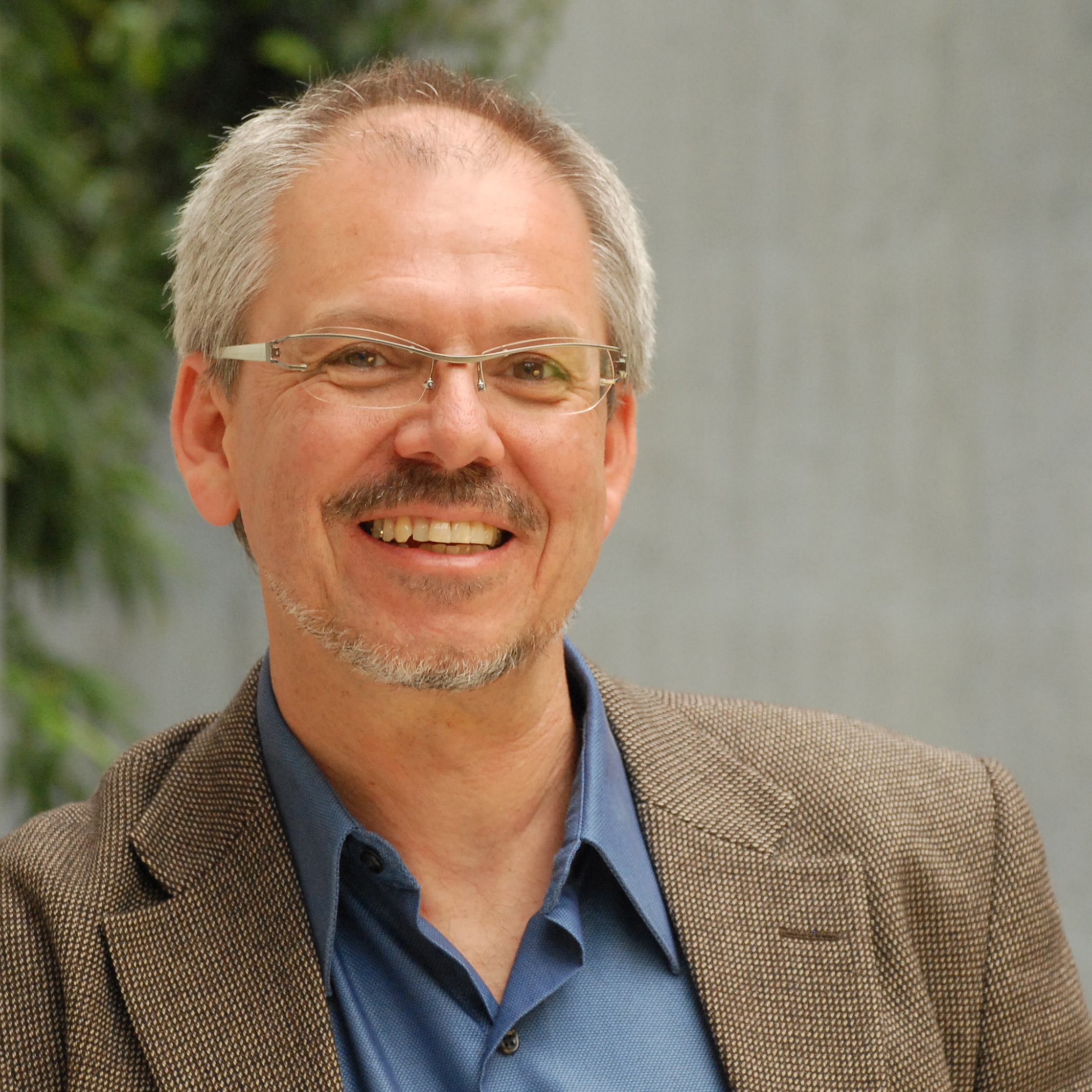講演1

Prof. Frank Allgöwer
University of Stuttgart, Germany; IFAC President
Bibliography: Frank Allgöwer is director of the Institute for Systems Theory and Automatic Control and professor in Mechanical Engineering at the University of Stuttgart in Germany. Frank's main interests in research and teaching are in the area of systems and control with a current emphasis on the development of new methods for optimization-based control, networks of systems, data-based control and systems biology. Frank received several recognitions for his work including the IFAC Outstanding Service Award, the IEEE CSS Distinguished Member Award, the State Teaching Award of the German state of Baden-Württemberg, and the Leibniz Prize of the Deutsche Forschungsgemeinschaft. Frank is President of the International Federation of Automatic Control (IFAC) for the years 2017-2020. He was Editor for the journal Automatica from 2001 to 2015 and is editor for the Springer Lecture Notes in Control and Information Science book series and has published over 500 scientific articles. Since 2012 Frank serves a Vice-President of the German Research Foundation (DFG).
Title: Structured Dissipativity for Distributed Economic Model Predictive Control
Abstract: This talk is concerned with the cost optimal operation of large-scale system interconnections by means of distributed economic MPC. In particular, the interconnection of dissipative subsystems through coupling costs is considered. Under certain conditions on the interconnection structure, the local subsystems' dissipativity properties carry over to the interconnected overall system, yielding structured (approximate) dissipativity of the overall system, which in turn characterizes its optimal mode of operation. Notably, this overall property can be verified locally and its structure resembles the interconnection structure, which allows for plug-and-play operations and application of non-iterative distributed economic MPC algorithms.
講演2

Prof. Janan Zaytoon
University of Reims, France; IFAC Immediate Past President
Bibliography: Janan Zaytoon is a Professor at the University of Reims Champagne-Ardenne. He is the Immediate-Past President of the International Federation of Automatic Control (IFAC), the Past Director of the French national research network/group “GDR MACS of CNRS” and the Founder and Past Director of the CReSTIC Research Center at the University of Reims Champagne-Ardenne. He is currently the Vice-Chair of the IFAC Foundation.
His work is related to the areas of discrete-event systems, hybrid systems, and intelligent control systems. He published and edited 52 books, conference proceedings and special journals issues. He also published 60 journal papers, 126 conference papers, and 6 patents.
Janan Zaytoon is the co-founder and past Editor-in-Chief of the IFAC Journal “Nonlinear Analysis: Hybrid Systems”. He initiated the series of IFAC ADHS Conferences on Analysis & Design of Hybrid Systems, and chaired 27 conferences. He Chaired the IFAC Technical Committee on Discrete-Event and Hybrid Systems, and received the IFAC Outstanding Service Award and the 2014 Paper Prize of the Journal of Engineering Applications of Artificial Intelligence. He has been invited plenary speaker for 8 international conferences, and invited visitor to 10 universities. He has also chaired the scientific excellence award committee of the French Ministry of Higher Education and Research.
His work is related to the areas of discrete-event systems, hybrid systems, and intelligent control systems. He published and edited 52 books, conference proceedings and special journals issues. He also published 60 journal papers, 126 conference papers, and 6 patents.
Janan Zaytoon is the co-founder and past Editor-in-Chief of the IFAC Journal “Nonlinear Analysis: Hybrid Systems”. He initiated the series of IFAC ADHS Conferences on Analysis & Design of Hybrid Systems, and chaired 27 conferences. He Chaired the IFAC Technical Committee on Discrete-Event and Hybrid Systems, and received the IFAC Outstanding Service Award and the 2014 Paper Prize of the Journal of Engineering Applications of Artificial Intelligence. He has been invited plenary speaker for 8 international conferences, and invited visitor to 10 universities. He has also chaired the scientific excellence award committee of the French Ministry of Higher Education and Research.
Title: Automatic Generation and Formal Verification of Safe PLC Programs for Railway Control Systems
Abstract: This lecture deals with research activities in partnership with SNCF (French Railway Company) to develop an integrated methodology for automatic generation, formal verification and implementation of safe PLC programs for Railway Control Systems. The first phase of the methodology focuses on the improvement of the engineering workflow during the design phase of the control system of the Power Supply Equipment of the Electric Lines (PSEEL). It results in a standardized generation of the control deliverables, including wiring diagrams and PLC programs. The second phase of the methodology is related to the application of formal verification and/or control synthesis techniques to guarantee the safety of the control installation. The verification procedure is used in place of the manual testing approaches to verify the conformity of the PLC programs with respect to safety properties that are defined by the expert. The verification is based on automatically generated models of the PSEEL, the PLC programs and PLC scan cycle. The control synthesis procedure consists of designing a robust filter to be used in conjunction with the PLC program in such a way to guarantee the generation of safe PLC-program outputs. This methodology results in: i) improving the “overloaded” workflow of systems engineers, while reducing the fatigue and stress, and ii) enhancing the system reliability due to the reduction of breakdowns on site.
講演3

Prof. Paul M. J. Van den Hof
Eindhoven University of Technology, the Netherlands; IFAC Vice President
Bibliography: Paul M. J. Van den Hof received the M.Sc. and Ph.D. degrees in electrical engineering from Eindhoven University of Technology, Eindhoven, The Netherlands, in 1982 and 1989, respectively. In 1986 he moved to Delft University of Technology, where he was appointed as Full Professor in 1999. From 2003 to 2011, he was founding co-director of the Delft Center for Systems and Control (DCSC). From 2005-2015 he was scientific director of the Dutch Institute for Systems and Control (DISC).
As of 2011, he is a Full Professor and heading the control systems group in the Electrical Engineering Department of Eindhoven University of Technology.
His research interests include system identification, identification for control,and model-based control and optimization, with applications in industrial process control systems, including petroleum reservoir engineering systems, and high-tech systems. He holds an ERC Advanced Research grant for a research project on identification in dynamic networks.
Paul Van den Hof is an IFAC Fellow and IEEE Fellow, and Honorary Member of the Hungarian Academy of Sciences. He has been a member of the IFAC Council (1999–2005, 2017-2020), the Board of Governors of IEEE Control Systems Society (2003–2005), and an Associate Editor and Editor of Automatica (1992–2005). In the triennium 2017-2020 he serves as chair of the Executive Board and Vice-President of IFAC.
As of 2011, he is a Full Professor and heading the control systems group in the Electrical Engineering Department of Eindhoven University of Technology.
His research interests include system identification, identification for control,and model-based control and optimization, with applications in industrial process control systems, including petroleum reservoir engineering systems, and high-tech systems. He holds an ERC Advanced Research grant for a research project on identification in dynamic networks.
Paul Van den Hof is an IFAC Fellow and IEEE Fellow, and Honorary Member of the Hungarian Academy of Sciences. He has been a member of the IFAC Council (1999–2005, 2017-2020), the Board of Governors of IEEE Control Systems Society (2003–2005), and an Associate Editor and Editor of Automatica (1992–2005). In the triennium 2017-2020 he serves as chair of the Executive Board and Vice-President of IFAC.
Title: Data-Driven Modeling in Linear Dynamic Networks
Abstract: In many areas of science and technology, the complexity of dynamic systems that are being considered, grows beyond the level of single systems into interconnected networks of dynamic systems. In control and optimization this has led to the development of decentralized and distributed algorithms for control/optimization, as e.g. in multi-agent systems. >From the perspectives of modeling and learning, data-driven modelling tools are typically developed for relatively simple open-loop and closed-loop structures, while the opportunities for big data handling in the current data science era, are becoming abundant. As a result there is a strong need for the development of data-driven modelling and learning tools for large-scale interconnected dynamic networks. In this seminar we will highlight the main developments and challenges in this area, including local module identification, sensor and actuator placement, graph-theoretic tools, as well aspects of network identifiability.
講演4

Prof. Dong-il “Dan” Cho
Seoul National University, Republic of Korea; IFAC Vice President
Bibliography: Dong-il “Dan” Cho received his B.S.M.E. degree from Carnegie-Mellon University, Pittsburg, PA, and M.S and Ph.D. degrees from Massachusetts Institute of Technology, Cambridge. From 1987 to 1993, he was an Assistant Professor at Princeton University, Princeton, NJ. Since 1993, he has been with the Department of Electrical and Computer Engineering at Seoul National University, Seoul, Korea, where he is currently Professor. He is also the director of Bio-Mimetic Robot Research (BMRR) center at Seoul National University. He is the author/coauthor of more than 130 international journal articles and the holder/coholder of more than 110 US and Korean patents. He has served on the editorial board of many international journals. Currently, he is Senior Editor of IEEE Journal of MEMS and IFAC’s Mechatronics. He was the President of ICROS in 2017, and is currently Vice President of IFAC and the Chair of the Technical Board of IFAC. He is an elected Senior Member of National Academy of Engineering of Korea.
Title: Biomimetic Robots
Abstract: Nature has been an inspiration for many technological innovations. Especially, research in biomimetic robots has been motivated by the superior characteristics of animals and insects which are utilized to overcome the limitations of conventional technologies. These biomimetic robots are being developed by applying various bio-electro-mechanical analyses, new materials, advanced nanotechnologies, and integration of various functionalities. In the future, autonomous biomimetic robots will also be developed by combining high-level artificial intelligence and ultra-low power circuits and wireless communication technologies.
In this talk, the state-of-the-art of biomimetic robots is presented. Representative ground biomimetic robots, aerial biomimetic robots, and underwater biomimetic robots will be introduced. Furthermore, the technological limitations of the present biomimetic robots and the direction of development that needs to be taken to overcome them will be discussed.
In this talk, the state-of-the-art of biomimetic robots is presented. Representative ground biomimetic robots, aerial biomimetic robots, and underwater biomimetic robots will be introduced. Furthermore, the technological limitations of the present biomimetic robots and the direction of development that needs to be taken to overcome them will be discussed.
